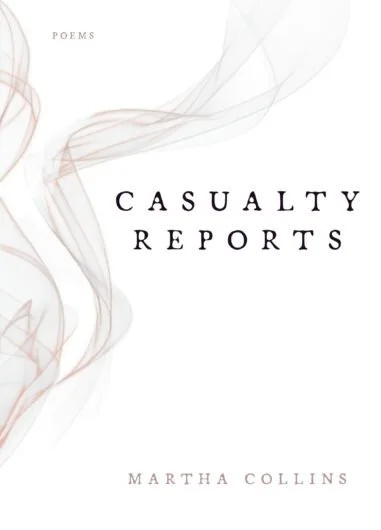Casualty Reports
University of Pittsburgh Press
$18.00
You can purchase a copy here.
Reviewed by Jennifer Schneider
In a world that doesn’t stop spinning amidst cycles of news (violence.loss.violence.loss) that don’t stop churning, sometimes memory is all we have. Both an anchor and a source of well-documented, research-based action, Casualty Reports grounds while simultaneously promoting change. The collection is both historical and future focused. The work prompts moments of pause amidst constant punctures of news (loss.violence.loss.violence). In a five-part collection that cycles through time, location, eras, and compounded casualties, Collins carves out space to reflect on the past and provides a toolbox that inspire future change.
I first read the collection about a week after the passing of Loretta Lynn. The film, Coal Miner’s Daughter, was still fresh in my mind. In a 2000 interview, Loretta Lynn said "I didn't think anybody'd be interested in my life". Lynn continued, "I know everybody's got a life, and they all have something to say. Everybody has a story about their life. It wasn't just me. I guess I was just the one that told it."
While Lynn may have been surprised at the interest others had in her life (Coal Miner’s Daughter was a hit, reaching number one on the Billboard country chart), she knew everybody has a story. In Casualty Reports, Martha Collins gives voice to stories too often silenced. She does so in varied forms, with a mix of stylistic variations that both personalize and distinguish the collection. Collins engages in story and takes on social issues across time and topic. Pieces offer commentary on coal mining (the collection’s two-part Legacy pieces), as well as gun violence, war, racism, and other social ills and ails.
Pieces are expertly researched and carefully detailed. From “first European sightings of coal” (A History of American Coal Through the Lens of Illinois 7) to the moment “when all the coal in the mine where it works will be exhausted” (Now That’s Big 37), the poems inform (resist urges to conform) and engage (sometimes enrage). The collection laments loss (physical, personal, emotional, geological) and, somehow amidst the plentiful layers of such loss, leaves readers hopeful that, perhaps, there is still time and a way to change the course of the future.
Often referred to as a “premiere lyricist”, Loretta Lynn “wasn’t afraid to … write about what she truly felt” (Vaughn 2022). Nor is Collins. Like Lynn’s lyrics, Collins’s words linger – in layers of Legacy (Parts I and III), Reports (Parts II and IV), “And Also” (Part V). Collins, like a coal miner’s daughter, crafts a revealing narrative on the history of coal while also mining a collection that moves far beyond coal and remains grounded in love and a commitment to the pursuit of justice for those we love.
My father’s father’s father owned the
had a share in the Enterprise mine the
Enterprise Coal & Coke Company 1871”
”(In Illinois”)
driving home from the grocery store with his girlfriend facing the cop with his hands up, stop don’t shoot
(“Four”)
In the child’s book, on the same page, it’s bedtime in one house, breakfast time in another. Stars here, sun there. There’s more and then there’s less again. Then more, if not so much. Not the end.
(“And Bright Stars”)
Collins pulls back curtains, layers language in a variety of compass directions, and reveals interactions, experiences, and sentiments that are sometimes infrequently recalled. The work, completed shortly before the first death due to COVID-19 occurred in the United States and dedicated (in part) to the virus’s many casualties, is simultaneously reflective and forward-focused. In addition to COVID-19, Collins dedicates the work “to the casualties of racism inflicted by the police and others; in the United States and throughout the world” as well as to the memory of her father, William E. Collins, and her friend, Lee Sharkey.
Just as memorable as the narratives are Collins’s careful research and varied use of space. All aspects of the collection are infused with both intentionality and originality. Many of the pieces – from the collection’s first piece (“In Illinois”) to its final (“Of Late”) – play with form and space as if to prompt proactive pause, reflection, and contemplation in contrast to what is often only reactive in the event of casualties. The collection’s pieces and the intimate narratives they reveal (“Du Quoin” and “Two Little Miners”), two of many examples) convey and reiterate a memorable truth. Ultimately, we all carry stories both original and universally relatable.
The collection is as much a repository as a reflection. From the origins, observations, and revelations of youth (One, Two, Three, Four, Five 25-29) to the finalities and questions of death (“For Gaza”). From the physical realities of latitude and longitude (“Cambridge 2019” and “L’Ultimo Viaggio”, two examples) to the recollections and connections of generations past (“Grave 33”). Casualty Reports digs deep and engages, then reengages, with life in its many dimensions. Of its multiple cycles. Of its never-ending questions. And, of course, its relentless casualties.
The collection is simultaneously personal and anonymous. Simultaneously of the past and the present. While many of the pieces celebrate the life of coal miners in Illinois (with many inspired by Collins’s family), one need not be from the region nor have any prior personal connection to coal mining to appreciate the power of the poems.
It’s deeply satisfying to read a work that inspires while simultaneously and consistently inciting fury – a work that prompts reflective melancholy and sentimentality while promoting action amidst agitation. Casualty Reports, by Martha Collins, is such a work. The work is honest, raw, and real. It is as informative (and carefully researched) as it is instructive (many of the pieces adopt unique forms). Readers will be moved on multiple levels - societal, literary, personal. Read it, then reread it – perhaps while listening to “Coal Miner’s Daughter” on replay. It’s a deeply worthwhile way to spend a day.
Jen Schneider is an educator who lives, writes, and works in small spaces throughout Pennsylvania. She loves words, experimental poetry, and the change of seasons. She’s also a fan of late nights, crossword puzzles, and compelling underdogs. She has authored several chapbooks and full-length poetry collections, with stories, poems, and essays published in a variety of literary and scholarly journals. Sample works include Invisible Ink, On Habits & Habitats, On Daily Puzzles: (Un)locking Invisibility, A Collection of Recollections, and Blindfolds, Bruises, and Breakups. She is currently working on her first series, which (not surprisingly) includes a novel in verse. She is the 2022-2023 Montgomery County PA Poet Laureate.


